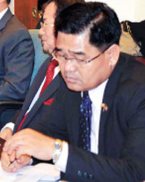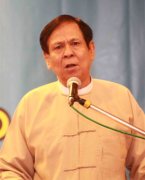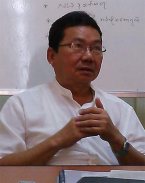Representatives of the government and Myanmar’s armed ethnic groups have begun historic talks aimed at ending more than 60 years of conflict.
The two-day meeting began yesterday in the Kachin state capital, Myitkyina, and brings together the government’s peace-making team and the leaders of armed ethnic groups.
The meeting follows a conference of armed ethnic groups in Laiza from October 30 to November 2 that agreed on a common ground [position] for the talks with the government team, the Union Peace-Making Group.
Mizzima sought the opinion of some political party leaders and MPs on the outcome of the Laiza conference and the prospects for a nationwide ceasefire.
 These are historic talks and their prospects are good. The talks are unprecedented. They will bring together for the first time in our history government negotiators and a delegation representing all the armed ethnic groups. Discussion at the talks will be centered on the 11-point common ground agreed by the armed ethnic groups at their conference in Laiza and a proposal from the government side so I doubt that the talks will result in an agreement. An immediate agreement is not possible but these talks are paving the way for a national ceasefire. That is very encouraging.
These are historic talks and their prospects are good. The talks are unprecedented. They will bring together for the first time in our history government negotiators and a delegation representing all the armed ethnic groups. Discussion at the talks will be centered on the 11-point common ground agreed by the armed ethnic groups at their conference in Laiza and a proposal from the government side so I doubt that the talks will result in an agreement. An immediate agreement is not possible but these talks are paving the way for a national ceasefire. That is very encouraging.
 The Myitkyina talks are significant because the government side will be meeting the armed ethnic groups as a single delegation; they are not separate meetings between the Union peace-making team and each armed ethnic organization. The armed ethnic groups will put forward their 11-point common ground on the ceasefire issue and on political dialogue with the government. They will be negotiating for the government side to accept their common ground. This meeting will be smooth, effective and speedy because this common ground is their common position on achieving peace. Although they have not yet disclosed their 11-point common ground, we can guess their position based on the attitudes of the United National Federal Council [which hosted the Laiza meeting] and of the other armed ethnic groups, which are already known. It is unlikely that an agreement will be reached at Myitkyina because we do not know how much decision-making power the government team has for its negotiations with the armed ethnic groups. If it does not have enough decision-making power and it cannot make a decision at this meeting, the planned signing ceremony for a nationwide ceasefire will be delayed.
The Myitkyina talks are significant because the government side will be meeting the armed ethnic groups as a single delegation; they are not separate meetings between the Union peace-making team and each armed ethnic organization. The armed ethnic groups will put forward their 11-point common ground on the ceasefire issue and on political dialogue with the government. They will be negotiating for the government side to accept their common ground. This meeting will be smooth, effective and speedy because this common ground is their common position on achieving peace. Although they have not yet disclosed their 11-point common ground, we can guess their position based on the attitudes of the United National Federal Council [which hosted the Laiza meeting] and of the other armed ethnic groups, which are already known. It is unlikely that an agreement will be reached at Myitkyina because we do not know how much decision-making power the government team has for its negotiations with the armed ethnic groups. If it does not have enough decision-making power and it cannot make a decision at this meeting, the planned signing ceremony for a nationwide ceasefire will be delayed.
Even though a ceasefire agreement may not bring peace immediately, the Myitkyina meeting is the first step towards peace and political dialogue once a ceasefire is agreed. So the ceasefire will be the first step. If the government can accede to most points of the ethnic armed groups’ common ground, the ceasefire process will be expedited and then peace and political dialogue will follow and be realized. I think the government should accede to the ethnic groups’ common ground.
 I think the Myitkyina meeting will be successful. But there might be some issues affecting the ethnic groups’ side, such as the curious absence of any Naga representatives until today. Perhaps these issues are the reason why the armed ethnic groups have so far declined to publicly release their 11-point common ground and they might have implications for the Myitkyina meeting. There are reports that the armed ethnic groups changed two points in the government’s proposal for their common ground. It is not yet known how significant are these two points. If they cannot agree on these two points, the ceasefire agreement will be delayed but it will not be a complete failure. I am encouraged by the willingness and eagerness of the government and the ethnic groups to achieve a ceasefire. It is achievable and likely to materialize. It is likely that the government would want the ceasefire and the political dialogue to be completed in 2015. The ethnic armed groups have demanded that the nationwide ceasefire accord must be signed by the Commander-in-Chief and the Vice Commander-in-Chief of the Defence Services.
I think the Myitkyina meeting will be successful. But there might be some issues affecting the ethnic groups’ side, such as the curious absence of any Naga representatives until today. Perhaps these issues are the reason why the armed ethnic groups have so far declined to publicly release their 11-point common ground and they might have implications for the Myitkyina meeting. There are reports that the armed ethnic groups changed two points in the government’s proposal for their common ground. It is not yet known how significant are these two points. If they cannot agree on these two points, the ceasefire agreement will be delayed but it will not be a complete failure. I am encouraged by the willingness and eagerness of the government and the ethnic groups to achieve a ceasefire. It is achievable and likely to materialize. It is likely that the government would want the ceasefire and the political dialogue to be completed in 2015. The ethnic armed groups have demanded that the nationwide ceasefire accord must be signed by the Commander-in-Chief and the Vice Commander-in-Chief of the Defence Services.
 The agreements on paper are very good and must be implemented and enforced in practice. The KIO/KIA (Kachin Independence Organisation/Kachin Independence Army) and government agreed in the past on a 7-point agreement but its implementation was weak. It is difficult to comment on the 11-point common ground agreed by the armed ethnic groups and how it will determine their negotiations with the government as it is yet to be publicly released. We hope for a nationwide ceasefire and for the meeting to be fruitful.
The agreements on paper are very good and must be implemented and enforced in practice. The KIO/KIA (Kachin Independence Organisation/Kachin Independence Army) and government agreed in the past on a 7-point agreement but its implementation was weak. It is difficult to comment on the 11-point common ground agreed by the armed ethnic groups and how it will determine their negotiations with the government as it is yet to be publicly released. We hope for a nationwide ceasefire and for the meeting to be fruitful.
But both sides consider only themselves and work only to achieve their wishes and desires despite their talk about defending the people. Any agreement on a ceasefire should provide for action to be taken in the event of non-compliance. And any action taken for non-compliance should be serious. It is important that both sides focus on the people’s interests and the people’s desires. Both the armed ethnic groups and the government should make trips to assess the people’s desires and take them into account in their negotiations. Apart from Restoration Council of Shan State/Shan State Army (RCSS/SSA), all armed ethnic armed groups attended the Laizaconference and signed the 11-point common ground. They also formed a coordination team for a nationwide ceasefire on November 2 to negotiate with the government on implementing their common ground.



